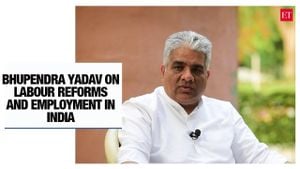The world of sports governance is facing increasing scrutiny, particularly after the recent scandal involving the Canadian women's soccer team, which raised concerns about ethical practices and leadership integrity. Bev Priestman, the head coach, was dismissed following findings from an independent investigation concerning the illegal use of drones to surveil opposing teams at the 2024 Paris Olympics.
The controversy kicked off when New Zealand lodged complaints about drone activity observed over their training sessions just days before their opening match against Canada. The alleged spying led FIFA to impose significant punitive measures against Canada Soccer, which included banning Priestman along with assistant coach Jasmine Mander and analyst Joseph Lombardi from any soccer-related activities for one year. FIFA also stripped the Canadian team of six points and issued fines, which only added more embarrassment to the national organization.
The fallout from this incident was swift and severe. Canada Soccer soon announced Priestman's termination, marking the end of her tenure just as the independent investigation concluded. The investigation, commanded to probe the allegations of drone surveillance, revealed not only this wrongdoing but also highlighted systemic issues within Canada Soccer—primarily, the organization's culture and oversight, which were described as insufficient.
According to the report, which Canada Soccer shared with the public, the incident was indicative of longstanding cultural flaws within the national teams. CEO Kevin Blue and President Peter Augruso acknowledged, "The findings of the independent investigator reveal...a difficult and unacceptable past culture within the national teams," indicating the extent of mismanagement and oversight failures.
Priestman, previously celebrated for leading Canada to gold at the Tokyo Olympics, found herself apologizing for the incident and accepting accountability as the leader of the squad. Her involvement was particularly problematic, as the report noted she had "directed, approved and condoned" the filming of the New Zealand training sessions.
The scandal didn't just tarnish the team’s reputation; it also set off alarm bells about possible broader unethical practices. The investigation concluded there was no evidence players had viewed the drone footage, which provided some relief but did little to absolve the coaching staff’s responsibility. It also revealed a deeply ingrained fear among assistant coaches and support staff, who felt they could not challenge the head coach's authority.
This incident has raised questions not only about the leadership styles within Canada Soccer but also about the protocols for oversight and accountability. No longer can issues be brushed under the carpet, as the governing body stated they were taking the findings seriously and would initiate disciplinary processes to rectify vulnerabilities within their structure.
Interestingly, the investigation also touched upon the conduct of former men’s head coach John Herdman, who led the Canadian women's team from 2011 to 2018. Allegations emerged about potential conduct violations during Herdman's tenure as well, though he has denied any wrongdoing during his watch. According to Canada Soccer, they attempted to interview Herdman about these potential violations but were unable to arrange a meeting due to scheduling conflicts.
Add to this, the fact the report found no evidence to support claims of drone spying by other national teams, adding another layer to the complexity of allegations and responses within soccer hierarchies.
Priestman's dismissal and the broader conclusions of the investigation signal potential changes within Canada Soccer aimed at preventing such incidents from occurring again. The leadership is expected to re-evaluate coaching practices, oversight protocols, and team culture moving forward.
While the team still had to compete under the shadow of these scandals at the Olympics—advancing to the quarterfinals only to lose dramatically to Germany—the focus is now on restructuring and restoring the Canadian Women’s National Team's public image and operational integrity.
The search for a new coach is already underway, with hopes of finding someone who embodies not only soccer expertise but also the capacity for ethical leadership and cultural reform. Canada Soccer seems determined to emerge as not only a competitive force on the international soccer stage but also as a responsible body committed to ethical governance and respect for the spirit of the game.
Moving forward, the Canadian squad faces the intense task of overcoming this scandal not just for themselves but also for their fans, who expect more from their leaders and coaching staff.



